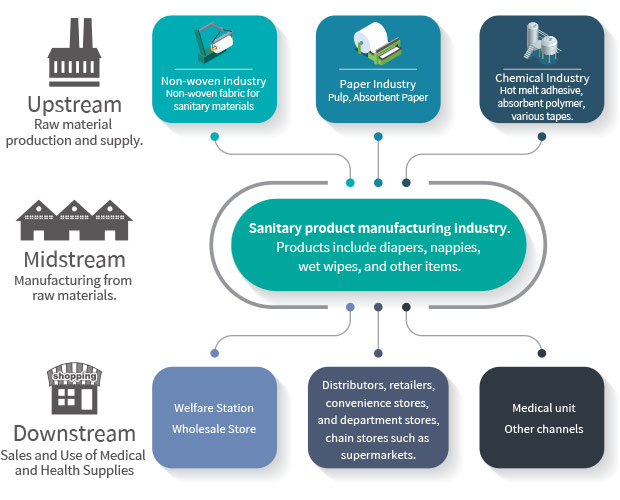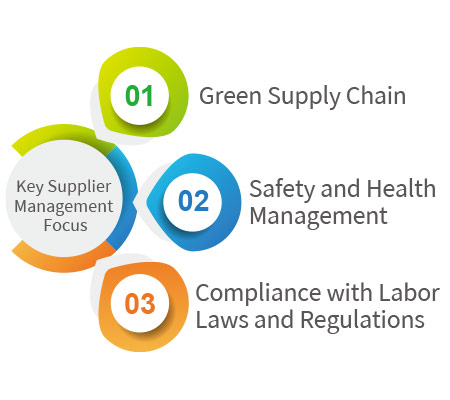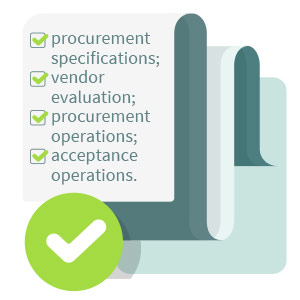Supplier Management Policy and Implementation Overview
Fuburg has established a responsible supply chain management mechanism. Through evaluation, auditing, guidance, and collaboration, the company audits suppliers to ensure compliance with environmental protection, occupational safety and health, and labor rights regulations. Suppliers are required to uphold corporate social responsibility and integrate sustainable development concepts into their daily operations to promote overall supply chain stability and growth.
Fuburg has mandated that suppliers follow relevant standards in the areas of environmental protection, occupational safety and health, and labor rights. Specific implementation mechanisms are incorporated into both the auditing and collaboration processes to ensure effective compliance.
Supply Chain Management Strategy and Specific Practices
Fuburg has established a supplier selection and evaluation mechanism to ensure suppliers possess sustainable development capabilities. This is achieved through regular reviews, capacity-building guidance, and responsible procurement practices.
Supplier Selection and Evaluation
-
Initial Screening: New suppliers must meet cooperation thresholds by obtaining environmental management certification (ISO 14001), social responsibility standards (SA 8000), and occupational safety and health standards (OHSAS 18001).
-
Annual Evaluation: Existing suppliers are assessed on compliance, quality stability, environmental impact, and labor conditions. Improvement recommendations are provided when necessary.
Responsible Procurement
-
Green Procurement: Priority is given to purchasing raw materials that meet environmental standards, while reducing opportunities for collaboration with suppliers using highly polluting processes.
-
Fair Trade: Ensuring suppliers pay fair wages, safeguard labor rights, and prohibit child labor, forced labor, and other unethical practices.
-
Safety Management: Requiring suppliers to implement occupational safety and health standards, provide necessary safety training, and equip employees with protective gear.
Supplier Sustainability Management Evaluation
Fuburg conducts sustainability capability assessments for suppliers, with the following scoring criteria:
| Evaluation Grade | Score Range | Improvement Recommendation |
|---|---|---|
| GOOD | 90–100 | Continue maintaining high standards. |
| SATISFACTORY | 80–89 | Conduct regular reviews to ensure the supplier continues to meet standards. |
| NEEDING IMPROVEMENT | 70–79 | Implement an improvement plan, including enhancements to environmental management and social responsibility. |
| SIGNIFICANT DEFICIENCY | Below 70 | If no improvement is made, reconsider the cooperation relationship. |
Supply chain management
Industry upstream, midstream, and downstream relationships
Fuburg’s main product is adult diapers, with raw materials including pulp, superabsorbent polymer, PE film, waterproof paper, and hot melt glue, among others. In the diaper industry, it is part of the downstream nonwoven fabric industry (nonwoven fabric for hygiene products). Diapers generally consist of three parts: surface material, absorbent material, and leak-proof layer. The surface material is made of nonwoven fabric, which does not absorb water and keeps the top layer dry against the skin. As for the absorbent material, the layer structure may vary by brand, but it typically includes cotton pulp, superabsorbent polymer, and absorbent paper. The absorbent paper helps guide the diffusion of urine and assists with the absorption of the cotton. The leak-proof layer at the bottom is made of low-density PE plastic, which prevents urine from seeping through to clothes or bed sheets. Finally, adhesive tape, elastic bands (made of natural rubber or PU thread), and tape-attached areas are added to secure the position of the diaper. The following diagram illustrates the upstream, midstream, and downstream relationships in the industry:
Industry upstream, midstream, and downstream relationship diagram.

Local Procurement
Fuburg’s procurement strategy has always been primarily focused on supporting local procurement. This not only drives domestic industry upgrading, reduces dependence on foreign suppliers, and increases local employment opportunities, but also promotes local economic prosperity and reduces costs by saving transportation energy. Fuburg hopes to share the benefits of growth with local suppliers and achieve a win-win goal.

Supplier Management Key Points
Before placing formal orders with major suppliers, Fuburg conducts on-site inspections and requests relevant proof of documents from suppliers. Through supplier evaluations, Fuburg assesses supplier quality, pricing, costs, delivery performance, environmental practices, occupational health and safety, hygiene, technology, and other factors to ensure that suppliers meet company standards.

Supply Status of Key Raw Materials
Fuburg’s primary raw material is pulp, which is imported from overseas, while other raw materials are sourced locally. We maintain strong and stable supply relationships with our key suppliers, ensuring a reliable and worry-free supply of materials. In terms of procurement risk diversification, delivery schedules, and purchase prices, we enjoy favorable conditions and long-term support from our suppliers.
Supplier Audit and Counseling
Fuburg regards all suppliers as partners and is committed to establishing long-term, stable, mutually beneficial relationships with them. To enhance the overall competitiveness of the supply chain, the company adopts relevant quality assurance operations management, including: 1. procurement specifications; 2. vendor evaluation; 3. procurement operations; 4. acceptance operations.
In addition, the key points of audit and counseling management are: supplier key management policies, major/minor supplier management, and the introduction of green supply chain concepts.

FUBURG has formulated “Regular Supplier Assessment Management Measures”, visits factories from time to time to assess the suitability of suppliers, and regularly evaluates each supplier. It maintains a good relationship of mutual trust with suppliers in the long term and works together towards quality and technology improvement. Therefore, suppliers are evaluated in four aspects: quality, cost, delivery time and service. In 2024, a total of 36 raw material suppliers and 4 outsourced product suppliers were evaluated. The assessment results are as follows:
| Rating | Number of Raw Material Suppliers | Number of Outsourced Product Suppliers | |
| Passed | Class A | 25 | 3 |
| Class B | 11 | 1 | |
| Class C | – | ||
| Unqualified | Class D | – | – |
